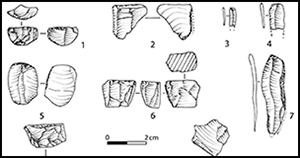Published online by Cambridge University Press: 08 April 2015

It has long been believed that the earliest ceramics in the central plain of China were produced by the Neolithic cultures of Jiahu 1 and Peiligang. Excavations at Lijiagou in Henan Province, dating to the ninth millennium BC, have, however, revealed evidence for the earlier production of pottery, probably on the eve of millet and wild rice cultivation in northern and southern China respectively. It is assumed that, as in other regions such as south-west Asia and South America, sedentism preceded incipient cultivation. Here evidence is presented that sedentary communities emerged among hunter-gatherer groups who were still producing microblades. Lijiagou demonstrates that the bearers of the microblade industry were producers of pottery, preceding the earliest Neolithic cultures in central China.
To send this article to your Kindle, first ensure no-reply@cambridge.org is added to your Approved Personal Document E-mail List under your Personal Document Settings on the Manage Your Content and Devices page of your Amazon account. Then enter the ‘name’ part of your Kindle email address below. Find out more about sending to your Kindle. Find out more about saving to your Kindle.
Note you can select to save to either the @free.kindle.com or @kindle.com variations. ‘@free.kindle.com’ emails are free but can only be saved to your device when it is connected to wi-fi. ‘@kindle.com’ emails can be delivered even when you are not connected to wi-fi, but note that service fees apply.
Find out more about the Kindle Personal Document Service.
To save this article to your Dropbox account, please select one or more formats and confirm that you agree to abide by our usage policies. If this is the first time you used this feature, you will be asked to authorise Cambridge Core to connect with your Dropbox account. Find out more about saving content to Dropbox.
To save this article to your Google Drive account, please select one or more formats and confirm that you agree to abide by our usage policies. If this is the first time you used this feature, you will be asked to authorise Cambridge Core to connect with your Google Drive account. Find out more about saving content to Google Drive.